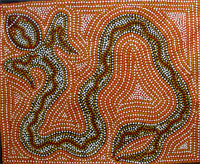The Rainbow Serpent Story
This dreamtime story of the rainbow serpent is by a member of the Lardil tribe of Mornington Island in the Gulf of Carpentaria off the North Coast of Australia.
They believe that "Thuwathu", Aboriginal name for the Serpent with the double tail and sometimes painted with a hooded head is the owner of the sea.
Different tribal groups have a different story of the origin of the serpent some being from the ground and some from the sea.
It holds the law of the Sea Country and that he made all landmarks food and water sources as he moved across the land.
The snake like paths that the various rivers take follows the natural movement of the snake on land.
It is believed that if a person goes down to the saltwater with greasy food on them the Thuwathu will enter the offenders body and cause great sickness, called Mulgarree.

Sometimes the serpent is depicited as a huge coiled python with horns from the Aboriginal Dreamtime.
The dreamtime stories are particular to each group of aborigines scattered all over the Australian continent.
Each story is accompanied by dance and music in a carefully choreograph ceremony commenced only after the tribal elders are satisfied that the preparation has been sufficent.
Other times it is a combination of fish, dugong and a serpent with scales like oyster shells and has the roar of a bull.
It’s eyes are said to have been made by shooting stars which were red in colour, but this can change to blue green yellow or white.
It is taboo to point at coloured shooting stars as this may cause bad luck, even sickness and death as you are not to look at the eyes of the rainbow serpent.
There is no restriction in pointing at white stars which indicates that turtle eggs or a newborn baby will soon be found.
It is easy to see how one creation story being passed on by word of mouth is able to change every of little each generation it is passed along.
Sandra Scholes Escobar
© Copyright 2010 All Rights Reserved No Reproduction Permitted Without Permission
Address : Michael Moriarty, PO Box office 14, Berry Springs, NT, 0838 Australia